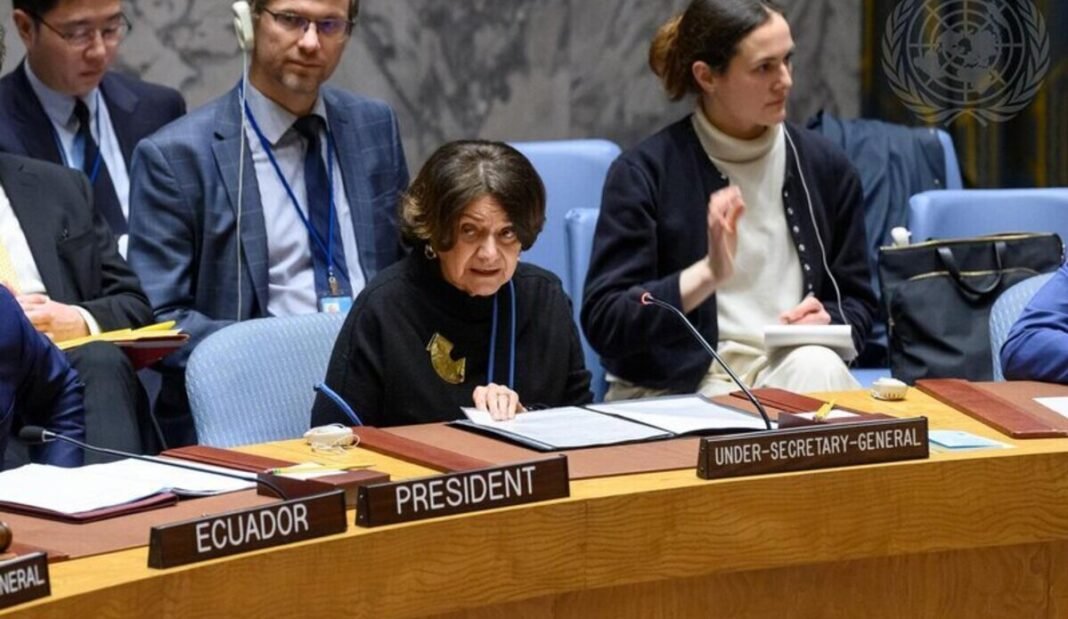New York City, 19 December 2023(TDI): UN Under-Secretary-General for Political and Peacebuilding Affairs, Rosemary DiCarlo, told the Security Council on Monday that diplomatic efforts to implement the 2015 Joint Comprehensive Plan of Action (JCPOA) remain stagnant.
Regardless of calls to all parties engaged in the agreement to ensure Iran does not develop nuclear weapons, there has been no progress.
The 2015 “Joint Comprehensive Plan of Action” (JCPOA) establishes standards for assessing Iran’s nuclear program and opens the path for international restrictions to be removed.
The agreement was reached by Iran, the five permanent members of the Security Council (France, Russia, China, the UK, and the USA), and additionally, Germany, along with the European Union.
During President Donald Trump’s administration, the United States backed off from the agreement in 2018, and the Security Council announced the lifting of sanctions in Resolution 2231 in 2015.
In this context, UN Political Affairs chief Rosemary DiCarlo stated that regardless of “constant calls on all parties involved to resume dialogue and participation aimed at a return to the full and effective implementation of the plan and resolution,” there has been no diplomatic move.
According to the Secretary-General, the JCPOA is the most important choice for ensuring Iran’s nuclear program stays peaceful. She emphasized that Iran must reverse operations taken since the deal’s collapse.
She stated, “Those that are not consistent with its nuclear-related commitments under the plan and which it has pledged are reversible.”
According to UN Secretary-General António Guterres, “the US will also need to lift or suspend its sanctions and extend waivers regarding oil trade with Iran in order for the deal to continue.”
Russian Permanent Representative Vassily Nebenzia stated, “There are no alternatives to the JCPOA.” The only way to meet the objectives of regional and international security is for the plan to be reset as soon as possible.”
Furthermore, Rosemary DiCarlo’s latest report indicated that Iran’s cessation of nuclear-related commitments under the JCPOA has significantly impacted the International Atomic Energy Agency’s (IAEA) monitoring and observation of the agreement.
Also Read: Iranian President Refers to Renewal of JCPOA
UN’s Position and Key Developments
The IAEA reports that the agency is unable to verify Iran’s enriched uranium stockpile, which is over 20 times the restriction imposed by the JCPOA.
Additionally, Iran’s missile limits ended on October 18, resulting in suspected violations of JCPOA nuclear-related limitations.
DiCarlo examined incidents concerning ballistic missile supplies and Russian forces’ use of missiles and drones manufactured by Iran or by Iran in Ukraine.
Reports suggest that a cruise missile launched in a Houthi rebel attack in Yemen in November 2022 was discovered to be of Iranian origin and may have been delivered in violation of UN Security Council Resolution 2231.
Also Read: JCPOA Joint Committee session begins
The wreckage in Yemen resembles previously investigated components of cruise missiles used in prior Houthi assaults on Saudi Arabia, the UAE, the US, and the UK.
Additionally, the Secretariat investigated the similarities in design, configuration, measurements, manufacturers, and part numbering.
At the end of the meeting, she promised that the UN would “continue to urge participants to exercise maximum restraint and to use all available diplomatic avenues in order to restore the plan.” Indeed, the fate of the players is in their hands.”
It depends on whether it succeeds or fails. She added, “Especially at this extremely dangerous moment in global peace and security, it matters to all of us.”



